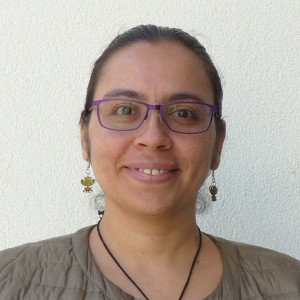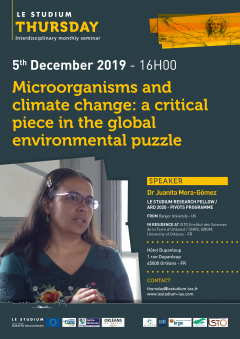Dr Juanita Mora-Gómez

From
In residence at
Earth Sciences Institute of Orléans (ISTO) / CNRS, BRGM, University of Orléans - FR
Host scientists
Dr Fatima Laggoun Défarge & Dr Sébastien Gogo
PROJECT
Role of microorganisms in the Carbon Cycling of Peatlands
Considered among the world’s largest carbon sinks, peatlands play a key role in the global carbon cycle. Globally, they keep 1/3 of the carbon stored in the soil, produce about 25% of the methane (CH4) and export substantial amounts of dissolved carbon to aquatic environments. Carbon cycling in peatlands is limited by a slowed microbial degradation of dead plant organic matter (POM) due to constrained environmental conditions, i.e. high concentrations of phenolic compounds, low pH, and anoxic conditions. POM’s polymers are degraded by extracellular enzymes activities (EEA) produced by microorganisms, eventually resulting in the emission of CH4 and CO2 to the atmosphere.
Peatland are broadly distributed, although they are more abundant in the northern hemisphere (Canada and Russia). Environmental variations, both natural or anthropogenic, such as the change in temperature, soil water, pH, nutrients or oxygen concentration, may affect POM processing by microorganisms and in consequence the total carbon cycle and gas emissions. Mechanisms behind to the factors controlling POM processing in peatlands are still poor understood, and the present project aims to improve our understanding of those mechanisms in French peatlands. During her stay, the fellow is supporting an existing research project (GHG Exchange between Soils and the Atmosphere in peatland - PESAt) at the host laboratory. The fellow is developing the experimental protocol to measure EEA in peat soil and water in the host lab and is studying the microbial metabolism (EEA) in relation to two environmental factors, temperature and soil depth in the La Guette peatland (a long-term study site of the ISTO’s peatlands group).
Publications
Final reports
Peatlands are key ecosystems in the global carbon balance due in part to the slow microbial degradation of the organic matter (OM) in peat soils. Role of peatlands as powerful carbon storage systems may be threatened by climate change, leading to a potential huge release of greenhouse gases to the atmosphere. Our knowledge on the mechanisms behind the microbial OM degradation is still incomplete, and it is also essential to develop better management strategies and mitigate global change impacts. In the frame of the present fellowship, the microbial extracellular enzymatic mechanisms of the OM degradation in peat soil and pore water were studied in a French altered peatland, assessing changes in soil depth and warming effect during an annual cycle. Additionally, to the research programme, during the present fellowship a new technique for the host laboratory was implemented (protocol to measure extracellular enzyme activities in pore water and peat soil), the fellow participated in several conferences and seminars, three publication were or are in the process of being published, and a new project with the host laboratory is in developing.

